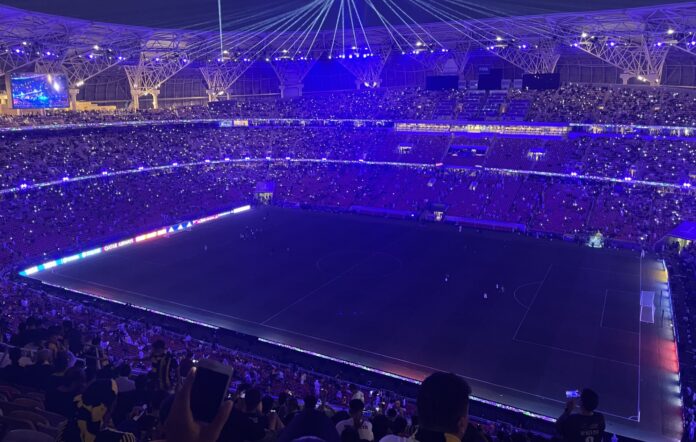Saudi Arabia‘s football market has garnered international attention, for its ambitious vision to develop domestic football. This vision is part of a broader initiative to transform the country into a global sports hub. One of the most striking aspects of the Saudi transfer market is the significant financial backing available to clubs, allowing them to aggressively attract big names from all over the world.
Some superstar names that have already made the move to the SPL include the likes of Cristiano Ronaldo, Karim Benzema, & Neymar. As the SPL continues to grow it is expected that international talents to continue to make the move.
Another noteworthy difference is the role of government club ownership and sponsorship. The Sovereign Wealth Fund of Saudi Arabia (PIF), which is the majority owner of Newcastle United in the English Premier League, has invested heavily in the SPL, acquiring seventy-five percent stakes in each of the four biggest clubs in the country: Al-Nassr and Al-Hilal in the capital Riyadh, and Al-Ittihad and Al-Ahli in the coastal city of Jeddah. Additionally, government owned companies have also purchased clubs in the SPL, Saudi Aramco owns a stake in Al-Qadsia, while Neom has acquired ownership of Al-Suqoor FC. The Driyah Gate Development Authority and The Royal Commission for Al-Ula Governorate have also separately invested in Al-Diriyah Club and Al-Ula Club. Understanding the landscape of ownership and sponsorship is critical for agents looking to navigate the Saudi football market effectively.
The Saudi Arabian football system is made up of four divisions with the SPL sitting at the top of the pyramid. The First Division comes next and each season the top three teams from the First Division will get promoted to the SPL while the bottom three SPL teams will get related to the First Division. Furthermore, the next step down the pyramid is the Second Division League, which is organized into two groups, each comprising of sixteen teams, with promotion and relegation occurring between this division and the First Division. In 2021, the Saudi Arabian Football Federation (SAFF) unveiled the Third Division League, a newly established fourth tier, consisting of four groups with eight teams each. Promotion and relegation take place between this new division and the Second Division. Additionally, SAFF has introduced new women’s football leagues, namely the Saudi Women’s Premier League and the Saudi Women’s First Division League, marking a significant expansion in the country’s football landscape.
A key regulatory aspect in Saudi Arabia is the limit on foreign players. Similar to other countries, Saudi Arabia has regulations to balance the development of local talent with the benefits of foreign expertise. The Saudi Pro League (SPL) has recently updated its first-team squad rules. Clubs will now be able to register ten non-Saudi players, however only eight non-Saudis will be allowed to participate in the starting lineup.
The Saudi Arabian football ecosystem also includes specific windows for transfers, aligned with global football calendars but with local considerations. Like most markets the Saudi transfer window is open for a shorter period in January and a longer 12-week period in the summer. The January window is open from the 1st of January until the 30th of January. The summer window opens on July 1st and closes on September 20th. Keeping up to date and having the knowledge of these transfer windows and the administrative process of SAFF is essential for timely and compliant transactions.
The financial aspect of football transfers in Saudi Arabia is notable for the high salaries offered to foreign players, which can be considerably more attractive than those in other leagues. The negotiation of contracts involves not only salary but also benefits such as housing, transportation, and bonuses, which are common in player contracts. Agents must be aware of the tax implications for foreign players in Saudi Arabia, which differ significantly from many European countries. Saudi Arabia has no personal income tax, making the net income significantly higher. However, understanding the nuances of contract law and ensuring compliance with local labor laws is crucial. The transfer fees and salaries for international players can be paid in either Euros or Dollars. However, engaging with financial experts who understand the Saudi financial system is advisable to ensure smooth transactions.
For foreign players and agents, navigating the visa and residency requirements is a key step in the transfer process. Saudi Arabia has specific visa categories for professional athletes and their support staff. Ensuring that all paperwork is in order, including employment contracts validated by SAFF and the Ministry of Labor, is essential for a hassle-free transfer.
Clubs in Saudi Arabia are increasingly investing in youth academies and infrastructure, aligning with the broader goals of the Saudi Vision 2030 to promote sports. Agents can find opportunities not just in negotiating player transfers but also in contributing to the development of football in the country. Lastly another point to note is in Saudi Arabia, Sharia law is practiced and can affect business dealings within the country. Sharia, or Islamic law, forms the foundation of the legal framework in Saudi Arabia, affecting all aspects of life, including sports and commercial transactions.

